本小节,我们来完成搜索模块的开发,首先,配置搜索模块的路由,打开src/script/config/router.js文件:
.state('search',{
url:'/search/:id',
templateUrl:'view/search.html',
controller:'searchCtrl'
});
然后,给搜索模块添加控制器,进入src/script/controller/文件夹,新建searchCtrl.js文件:
'use strict';
angular.module('app')
.controller('searchCtrl',['$http', '$scope', function ($http, $scope) {
}]);
现在来创建我们的搜索页面,在src/view/目录下,新建search.html文件:
<!-- 搜索条 -->
<div class="search">
<button>取消</button>
<input type="text">
<button>搜索</button>
</div>
<!-- tab切换 -->
<div app-tab></div>
<!-- 职位列表 -->
<div app-position-list></div>
<!-- 底部菜单 -->
<div app-foot></div>
此时的页面效果如下图所示:

我们来给搜索页面添加样式,新建文件src/style/search.less文件,并引入index.less文件,样式代码我就省略了,添加完样式的页面搜索栏如下:

页面中间主体部分是一个tab切换的窗口,包含城市/薪资/公司规模,我们在src/view/template/目录下,新建tab.html组件模板,同时建立src/style/template/tab.less文件添加样式(样式代码省略),tab.html:
<ul class="tab">
<li class="d-ib ta-c active">城市</li>
<li class="d-ib ta-c ">薪资</li>
<li class="d-ib ta-c ">公司规模</li>
</ul>
然后在src/script/directive/目录下创建tab自定义指令,新建文件tab.js:
'use strict';
angular.module('app').directive('appTab',[function(){
return {
restrict:'A',
replace:true,
templateUrl:'view/template/tab.html'
}
}])
现在中间主体tab部分的组件已经嵌入进search模块中了,我们打开searchCtrl.js文件,给tab组件中的职位列表添加数据:
'use strict';
angular.module('app')
.controller('searchCtrl', ['$http', '$scope', function($http, $scope) {
$http.get('/data/positionList.json').success(function(resp) {
$scope.positionList = resp;
})
}]);
然后打开search.html文件,将获取的数据绑定到组件中:
<!-- 职位列表 -->
<div app-position-list data="positionList"></div>
现在,我们的搜索模块已经可以看到职位列表了:

下面的工作,是给搜索模块添加一个弹出窗口,以显示筛选条件。进入search.html文件,在app-foot组件下方,添加组件app-sheet:
<!-- 底部菜单 -->
<div app-foot></div>
<!-- 筛选窗口 -->
<div app-sheet></div>
然后新建app-sheet组件的模板文件,src/view/template/sheet.html
<div class="sheet" ng-show="visible">
<div class="wrap">
<ul>
<li class="d-b ta-c">不限</li>
<li class="d-b ta-c">少于50人</li>
<li class="d-b ta-c">50~100</li>
<li class="d-b ta-c">100~500</li>
<li class="d-b ta-c">500人以上</li>
</ul>
<button>取消</button>
</div>
</div>
在sheet.html中,用ng-show来控制窗口显示与隐藏。
接着创建sheet组件的自定义指令文件src/script/directive/sheet.js
'use strict';
angular.module('app').directive('appSheet',[function(){
return {
restrict:'A',
replace:true,
templateUrl:'view/template/sheet.html'
}
}])
同样我们需要在src/style/template/下创建sheet.less文件并引入到index.less文件中,样式代码省略。页面效果如下:

说明:在在sheet.html中,用 ng-show="visible"来隐藏窗口
现在,搜索模块的静态页面已经完成了,我们来实现它的业务逻辑代码,按照页面从上到下的顺序,首先实现搜索功能,打开search.html文件,给搜索栏添加数据模型、指令以及点击事件:
<!-- 搜索条 -->
<div class="search-bar ta-c">
<!-- 添加点击事件,先清空name值,然后再调用search()函数 -->
<button ng-click="name='';search();">取消</button><!-- 添加ng-model数据模型 -->
<input ng-model="name" type="text" placeholder="搜索职位/公司/城市">
<!-- 给搜索添加点击事件search()函数 -->
<button ng-click="search();">搜索</button>
</div>
然后打开searchCtrl.js文件,添加search()函数执行数据查询:
'use strict';
angular.module('app')
//注入服务$http $scope
.controller('searchCtrl', ['$http', '$scope', function($http, $scope) {
//先清空name值
$scope.name="";
//定义search()函数,执行数据查询
$scope.search = function() {
$http.get('/data/positionList.json?name='+$scope.name).success(function(resp) {
$scope.positionList = resp;
});
};
//调用search()函数
$scope.search();
}]);
搜索栏部分的业务逻辑我们已经添加完成了,现在来处理中间tab切换窗口部分的逻辑,这部分我们要实现点击城市/薪资/公司规模的时候,弹出窗口显示筛选过滤条件的选择列表,我们将使用过滤器来实现这一功能。
首先打开src/view/template/tab.html文件,修改代码:
<ul class="tab">
<!-- 添加ng-repeat指令拿出可变的数据,然后使用ng-bind指令绑定到元素中,再添加一个ng-click指令绑定click()函数,实现tab切换的功能,在class类里,有一个三目运算,判断选中元素高亮的样式 -->
<li ng-click="click(item)" ng-repeat="item in list" class="d-ib ta-c {{selectId===item.id?'active':''}}" ng-bind="item.name"></li>
</ul>
然后,打开src/script/directive/tab.js文件,为tab切换添加点击事件:
'use strict';
angular.module('app').directive('appTab',[function(){
return {
restrict:'A',
replace:true,
scope:{
list:'=',
tabClick:'&'
},
templateUrl:'view/template/tab.html',
link:function($scope){
$scope.click = function(tab){
$scope.selectId = tab.id;
$scope.tabClick(tab);
}
}
}
}]);
tab组件及其业务逻辑,我们已经完成了,下面进入src/script/config/目录下,创建dict.js来存放我们的全局变量:
'use strict';
//使用.value创建全局变量
angular.module('app').value('dict', {}).run(['dict', '$http', function(dict,$http){
$http.get('/data/city.json').success(function(resp){
dict.city = resp;
});
$http.get('/data/salary.json').success(function(resp){
dict.salary = resp;
});
$http.get('/data/scale.json').success(function(resp){
dict.scale = resp;
});
}]);
打开src/view/search.html,修改app-tab部分的代码:
<!-- tab切换 -->
<div app-tab list="tabList" tab-click="tClick(id,name)"></div>
定义好全局变量dict(我们采用依赖注入的方式使用这个全局变量),又给app-tab组件添加了数据接口和方法,打开searcjCtrl.js文件:
'use strict';
angular.module('app')
//注入$http $scope dict
.controller('searchCtrl', ['dict','$http', '$scope', function(dict, $http, $scope) {
$scope.name="";
$scope.search = function() {
$http.get('/data/positionList.json?name='+$scope.name).success(function(resp) {
$scope.positionList = resp;
});
};
$scope.search();
$scope.tabList = [{
id:'city',
name:'城市'
},{
id:'salary',
name:'薪资'
},{
id:'scale',
name:'公司规模'
}];
$scope.tClick = function(id,name){
console.log(id,name);
};
}]);
此时,我们的tab组件已经可以显示分类标题了,下面要实现的是,点击分类标题的时候弹出筛选列表的功能,我们先来修改列表组件的模板和自定义指令,分别打开sheet.html和sheet.js:
sheet.html:
<div class="sheet" ng-show="visible" ng-click="visible=false;">
<div class="wrap">
<ul>
<!-- 使用ng-repeat和ng-bind指令获取展示数据,并添加click事件 -->
<li ng-click="select(item)" class="d-b ta-c" ng-repeat="item in list" ng-bind="item.name"></li>
</ul>
<!-- 给按钮添加click事件,使点击取消时列表消失 -->
<button class="d-b" ng-click="visible=false;">取消</button>
</div>
</div>
sheet.js:
'use strict';
angular.module('app').directive('appSheet',[function(){
return {
restrict:'A',
replace:true,
scope:{
list:'=',
visible:'=',
select:'&'
},
templateUrl:'view/template/sheet.html'
}
}]);
sheet组件模板相关代码已经修改好了,现在打开search.html文件,修改一下app-sheet组件:
<div app-sheet select="sClick(id,name)" list="sheet.list" visible="sheet.visible"></div>
打开searchCtrl.js文件,我们来实现点击tab标题显示对应列表窗口的逻辑:
'use strict';
angular.module('app')
//注入$http $scope dict
.controller('searchCtrl', ['dict','$http', '$scope', function(dict, $http, $scope) {
$scope.name="";
$scope.search = function() {
$http.get('/data/positionList.json?name='+$scope.name).success(function(resp) {
$scope.positionList = resp;
});
};
$scope.search();
$scope.tabList = [{
id:'city',
name:'城市'
},{
id:'salary',
name:'薪资'
},{
id:'scale',
name:'公司规模'
}];
$scope.filterObj = {};
var tabId = '';
$scope.sheet = {};
$scope.tClick = function(id,name){
tabId = id;
$scope.sheet.list = dict[id];
$scope.sheet.visible = true;
};
$scope.sClick = function(id,name){
if(id){
angular.forEach($scope.tabList, function(item){
if(item.id===tabId){
item.name=name;
}
});
}else{
angular.forEach($scope.tabList, function(item){
if(item.id===tabId){
switch(item.id){
case 'city':item.name = '城市';
break;
case 'salary':item.name = '薪资';
break;
case 'scale':item.name = '公司规模';
break;
}
}
});
};
};
}]);
现在,我们实现了点击列表项,实现tab标题替换的功能,但是,我们希望点击列表项,替换标题内容的同时,职位列表的内容也可以做出对应的筛选,这就要用到过滤器了,在src/script/目录下,新建filter文件夹并新建文件filterByObj.js:
'use strict';
angular.module('app').filter('filterByObj',[function(){
return function(list, obj){
var result = [];
angular.forEach(list, function(item){
var isEqual = true;
for(var e in obj){
if(item[e]!==obj[e]){
isEqual = false;
};
};
if(isEqual){
result.push(item);
};
});
return result;
};
}]);
因为我们是要对职位列表进行过滤,所以要把过滤器放到职位列表组件内,打开src/view/template/positionlist.html文件:
<li ui-sref="position({id:item.id})" class="item" ng-repeat="item in data|filterByObj:filterObj">
然后,打开positionlist.js文件,添加过滤器暴露接口:
'use strict';
angular.module('app').directive('appPositionList',[function(){
return {
restrict:'A',
replace:true,
templateUrl:'view/template/positionlist.html',
scope:{
data:'=',
filterObj:'='
}
};
}]);
打开search.html文件,添加接口:
<!-- 职位列表 -->
<div app-position-list data="positionList" class="search-list" filter-obj="filterObj"></div>
最后,打开searchCtrl.js文件,将我们的过滤器赋值:
'use strict';
angular.module('app')
//注入$http $scope dict
.controller('searchCtrl', ['dict','$http', '$scope', function(dict, $http, $scope) {
$scope.name="";
$scope.search = function() {
$http.get('/data/positionList.json?name='+$scope.name).success(function(resp) {
$scope.positionList = resp;
});
};
$scope.search();
$scope.tabList = [{
id:'city',
name:'城市'
},{
id:'salary',
name:'薪资'
},{
id:'scale',
name:'公司规模'
}];
$scope.filterObj = {};
var tabId = '';
$scope.sheet = {};
$scope.tClick = function(id,name){
tabId = id;
$scope.sheet.list = dict[id];
$scope.sheet.visible = true;
};
$scope.sClick = function(id,name){
if(id){
angular.forEach($scope.tabList, function(item){
if(item.id===tabId){
item.name=name;
}
});
$scope.filterObj[tabId + 'Id'] = id;
}else{
delete $scope.filterObj[tabId + 'Id']
angular.forEach($scope.tabList, function(item){
if(item.id===tabId){
switch(item.id){
case 'city':item.name = '城市';
break;
case 'salary':item.name = '薪资';
break;
case 'scale':item.name = '公司规模';
break;
}
}
});
};
};
}]);
现在就可以实现筛选功能了:

至此,搜索模块开发完成了。
